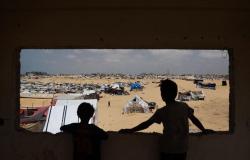Fishing boats small and large, torn, some completely submerged under water, others with only the bow emerging and pointing towards the sky, the nets and floats adrift or twisted, the hulls smashed or incinerated on the beach, hit squarely by the bombings. Images of destroyed boats follow one another in the online chat. «I miss the sea and I miss the fish», she lets herself say Zakaria Bakr. He is a fisherman and is the president of the General Union of Fisheries and Maritime Workers of Gaza. Displaced with his family since November, he is now in Rafah. «We live in inhumane conditions», he says and alternates the words with photos of boats in ruins. Even before this war, the life of the fishermen of the Strip was tormented and risky due to the limitations on navigation imposed by the Israeli authorities, the confiscations of boats suffered by those who did not respect the limits and the maritime blockade, as well as land and air, in in force since 2007.
Now that “famine is imminent in the northern governorates and is expected which will occur between mid-March and May,” as reported in an Integrated report Food Security Phase Classification (IPC, classification on which governments, UN agencies and NGOs are based), there would be a greater need than ever to go out fishing to feed the population. Putting yourself into the sea, however, is a risk that few people take today. «The boats were destroyed, but on the coast of Rafah, Gaza City and Deir al-Balah some fishermen driven by hunger still use small canoes to catch some fish. Everyone is afraid of entering the water due to the presence of warships a kilometer and a half from the coast”, continues Bakr. «But when they move away, there are those who go up to a kilometer from the beach for very quick fishing trips. The Israeli navy targets those who try. Last week two brothers they were killed at sea.”
The fishing sector was one of the main sources of food supply in the Strip. «There were 4,500 fishermen, 1,150 boaters, 1,000 canoeists, 1,500 workers of the related industries, including drivers, fishmongers, ice factory workers. Now 90% are displaced in Rafah and the central region, and many have died,” explains Bakr. Then his memory goes back to years gone by. «We met many Italians who came to show solidarity with us fishermen. Among them also Vittorio Arrigoni, my wonderful friend”, he writes recalling the activist and journalist killed in Gaza in 2011. “Now here in the asylum where I am there is no guarantee that I will still be alive tomorrow. There are no words to describe what we are going through. Some members of my family are still under the rubble of their home. Every day we say goodbye to someone. My nephew Muhammad died today, he had gone to look for flour. Two months ago it happened to his brother Adham.”
After the images of the destroyed boats, Zakaria Bakr sends two more shots before this war, along with a video. In one photo he is steering the helm of a motor boat off the coast of Gaza City.
In the second shot, you can see the port square covered by an expanse of colored boxes with the catch of the day. Then in a film they stand out, on a beachdozens of small boats move simultaneously, pushed into the water by fishermen, who run onto the shore and jump on board in unison.
For Latest Updates Follow us on Google News





